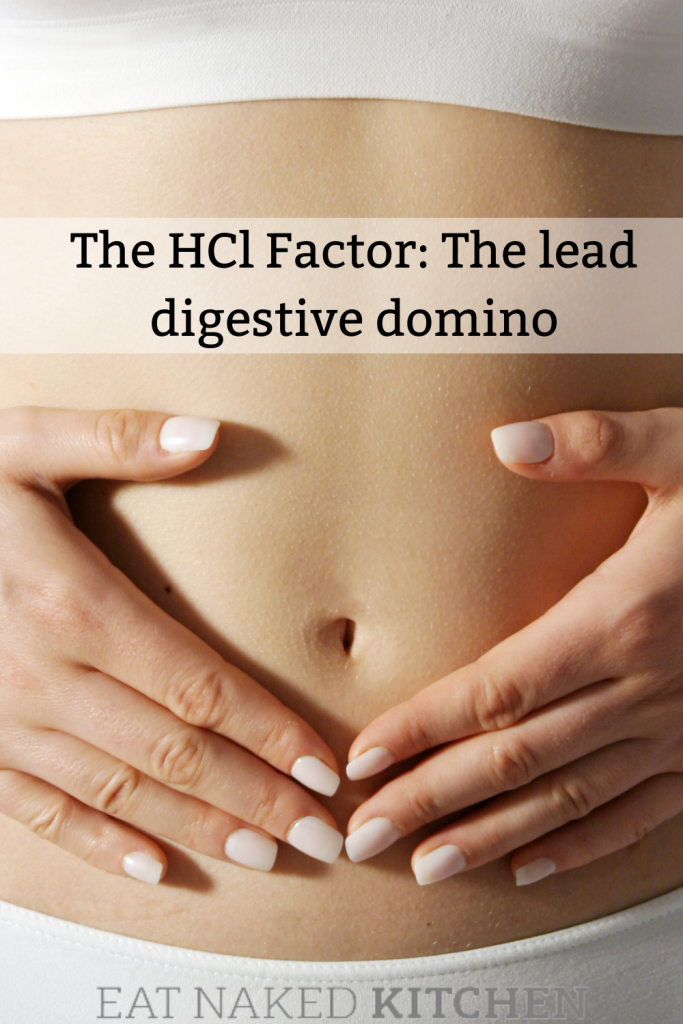Important disclaimer: I am not a doctor and the information presented here is for your information only, not for the purposes of diagnosing, treating, or curing any ailment. It is your responsibility to seek appropriate medical advice from a qualified health care practitioner. I strongly advise you to consult a qualified health professional before embarking on any significant changes to your diet, lifestyle, or supplement regime. Please read my full disclaimer here.
I’m about to share with you one of the most powerful tools I use in my practice: hydrochloric acid (HCl).
If you told me I could only use ONE supplement with my clients for the rest of my practicing years, this is what I would choose.
HCl is the single most common deficiency I see in my practice. I have yet to find someone who is truly sufficient when we first start working together. The impacts of a deficit are far reaching. Let me explain…
To begin let’s do a lil’ basic anatomy and physiology so we’re all on the same page.
At the most basic level, your digestive tract is essentially one big long tube that starts at your mouth and ends at your anus, with a bunch of little valves that keep things going in the right direction along the way. Digestion is this incredible process where something from the outside world – food – becomes part of your body. It’s beautifully orchestrated and happens (ideally) without any conscious effort.
At each stage in the process the food gets broken down into increasingly smaller bits and pieces, until it is down to its smallest form and is absorbed into the blood stream where it gets shuttled to different parts of the body. Anything left over gets pooped out.
HCl is a lead domino in this whole process.
Hydrochloric acid, or HCl, is the stomach acid secreted by the parietal cells that line the stomach in the presence of protein. The release of HCl stimulates the secretion of the enzyme pepsin, which is primarily responsible for the breakdown of proteins. Being able to properly break down and assimilate protein is critical for building muscle mass, for many important hormones, for shedding fat, for managing blood sugar levels, for strengthening our immune system, and for any kind of tissue repair. So yeah, it’s kinda critical.
But its importance goes far beyond the digestion of protein:
Stomach emptying: The stomach must be sufficiently acidic (with a pH of between 1.5 and 3) to trigger the pyloric valve – the valve between the bottom of the stomach and the top of the small intestine – to open and allow the stomach contents to pass through. Without sufficient acidity, the contents of the stomach will stay there too long and start to ferment, causing gas, bloating and general discomfort. If any of these gasses build up enough to push a little of the stomach contents up into the esophagus, we get the symptoms of heartburn. If this happens chronically, it can turn into Gastro-Esophageal Reflux Disease, or GERD. Maybe this seems counterintuitive, but it’s true: heartburn, acid reflux and GERD are more often than not the result of too little stomach acid, not too much.
Fat digestion: Sufficient stomach acidity is needed to stimulate the secretion of cholecystoknin, or CCK, a hormone that tells the gallbladder to release bile to break down fats and escort toxins from the body.
Digestive enzyme secretion: It’s required to stimulate the pancreas to secrete the digestive enzymes. These enzymes continue and finalize the breakdown of all key nutrients. So proper stomach acid production is needed to support all nutrient digestion.
pH neutralization of the chyme entering the small intestine: Proper stomach acidity stimulates the duodenum (the first part of the small intestine below the stomach) to secrete a hormone called secretin, which triggers the release of sodium bicarbonate. Sodium bicarbonate is required to neutralize the highly acidic contents of the stomach (called “chyme”) in preparation for a healthy environment in the small intestine.
Micronutrient absorption: HCl activates a protein called intrinsic factor, which is essential in the absorption of vitamin B12, and HCl is required for proper mineral absorption. This has significant consequences for vegans who typically have very low HCl and who need to get their B12 through supplementation, which doesn’t trigger the production of the HCl or intrinsic factor required to properly absorb it.
First line of defense: Stomach acidity is the body’s first line of defense against food-borne pathogens. It’s a great idea to take some supplemental HCl with you when you’re traveling to areas with questionable food quality.
Without sufficient HCl, so much is compromised:
- It’s harder to build muscle and shed fat
- Food sensitivities develop
- Sugar cravings increase
- GI symptoms such as bloating, acid reflux, gas, and cramping creep in, sometimes getting as bad as urgent diarrhea after meals
- You roll out the red carpet for food-borne pathogens such as parasites
- Energy levels sag
- You don’t absorb key nutrients from your meals (or your supplements for that matter). What a shame to spend your hard-earned money on delicious, healthy food and not get the full benefit.
- You run the risk of creating more challenging long-term GI issues such as SIBO, Irritable bowel, and even auto-immune diseases such as Ulcerative Colitis and Crohn’s.
Can you see why it’s such a critical part of my protocols?
The production of stomach acid can decrease for many reasons.
Poor dietary choices, stress (both physical and mental), a vegetarian/vegan diet, and certain medications are just a few examples of contributing factors in decreased production of stomach acid. Even when those factors are mediated, the aging process itself can cause decreased production of stomach acid. It’s called hypochlorhydria, and when this occurs, a whole host of symptoms can show up.

HCl and heartburn: It’s not what you think
But wait a second! What about all the heartburn and acid reflux that is absolutely rampant these days? Don’t we all suffer from too much acidity in our stomachs, not too little?
As hard as it is to believe with the heavy promotion of antacids and acid-blockers, most people with symptoms of heartburn, acid reflux and GERD are actually hypochlorhydric (too little acidity), not hyperchlorhydric (too much acidity). In fact, most people who are prescribed antacids by their doctors aren’t actually tested for stomach acidity levels. And when tested, it’s actually quite rare that the levels come back high. Let me explain:
Your esophagus has a pH of about 7, which is very neutral. Your stomach, on the other hand, needs to be a pH of 1.5-3, very acidic, for optimal digestion. Your stomach prepares for such an acidic environment by secreting mucous to protect its lining so that you don’t literally digest yourself.
The esophagus has no such protective coating. As I explained above, if you’re not secreting enough acid, the pyloric valve doesn’t open, and the contents of your stomach start to ferment, creating gas and pressure. The gas has to be released one way or the other. If it goes up and leads to belching, that means the esophageal valve – the valve that connects the esophagus to the stomach – has opened and allowed that gas to travel up. Sometimes, along with the gas, a little bit of stomach juices splurge up into the esophagus. Ouch!!! The delicate lining of the esophagus is not equipped to handle such acidity. This can result in “heartburn,” which feels like a painful burning in the chest or stomach, or a full feeling in the throat.
This is why antacids work on symptoms but they actually exacerbate the root cause of the problem. Sure, an antacid will soothe that burning, but at the same time it’s lowering your stomach acid production, which was the root issue to begin with. You can see how this can spiral quickly downhill…
With most digestive dysfunction comes hypochlorhydria; you won’t heal without fixing it.
Hypochlorhydria at the root of many digestive problems, from parasites to food sensitivities, from small intestinal bacterial overgrowth (SIBO) to irritable bowel syndrome (IBS), and more.
So the question is, do you have hypochlorhydria? Here are 13 signs that you may not be producing enough stomach acid.
Correcting low stomach acidity
If you suspect that you have low stomach acidity, don’t sweat it. Most adults do to some degree, and I’m here to help! The good news is that correcting low HCl levels is quite easy through some basic supplementation and lifestyle habits.
Now when it comes to supplementation, we need to consider factors that are beyond the scope of a simple blog. I strongly recommend working with a functional nutritionist who can guide you through this process safely. Not everyone’s digestion is ready to dive into HCl supplementation; some require some healing work beforehand and supplementing with HCl inappropriately can seriously aggravate certain pre-existing conditions.
Even without supplementation, there are some simple things you can do to support healthy stomach acid levels:
1. Eat sitting down, slowly, in a relaxed state.
I can’t overemphasize the importance of your physical and mental state when you eat. Digestion is a parasympathetic process, meaning it only happens when you’re in a relaxed state. If you’re under stress, your digestion is compromised. Sit down for your meals, take 10 deep belly breaths before you start eating to switch you into a relaxed state, and eat at a leisurely pace, chewing and savoring each mouthful. Digestion actually begins in our brains, and this allows our brains to initiate many important processes, including the release of HCl in the stomach.
2. Give yourself some time to digest.
We know you’re busy, but do your best not to rush right into the next activity after a meal. It’s no accident that many cultures structure their days to have some downtime after a meal. It’s important to give your body some time to get the digestive process underway. You don’t need a whole afternoon of napping and lazing around, but you could take a leisurely 15 minute walk after lunch rather than diving right back into work.
3. Eat your last meal of the day at least 3 hours before you need to go to bed.
As far as stomach acidity is concerned, this strategy gives your body a little time to digest before lying down. It’s also optimal for fat loss and a better night of sleep. If you do suffer from heartburn, you’ll find that this strategy can help you reduce symptoms that are exacerbated when lying down.
4. Drink a glass of warm water with lemon juice or 1Tbsp of raw apple cider vinegar before meals.
This strategy won’t increase your stomach acid production (you can’t make what you don’t have), but it will inspire your stomach to secrete the acid you can produce. In other words, this will optimize the HCl you already produce, but if you have a deficiency, it won’t help you create more.
If this topic is interesting to you, check out Why Stomach Acid is Good For You, by Dr. Jonathan V. Wright.




Thank you for posting. This was great! Much appreciated. As we get older, the body does not produce as much HCl.
So informative! I love it how you go into detail on the subject – I always had a good sense of how important HCl was, but this really expounds on it. Thanks, M 🙂
Margaret, your insight is amazing. I wonder why 95% of GPs never consider low stomach acidity to be the major problem, and prescribe some sort of acidity suppressors… Industry’s “guidelines”? Anyway, thanks a million, and I’ll go get my Betaine HCl.
How much HCI do I need daily ?
That’s impossible for us to know without assessing your specific needs. Typically when someone uses HCl, they move up slowly based on their body’s response.